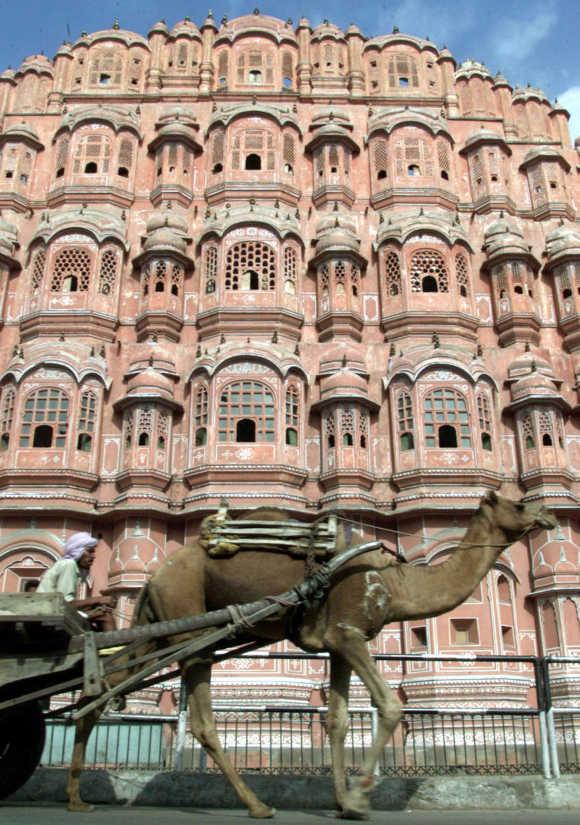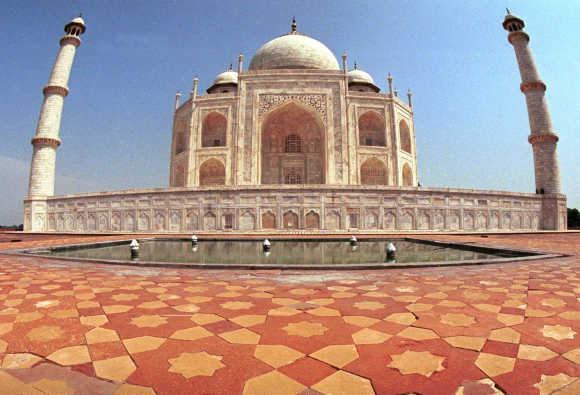Photographs: Pawel Kopczynski/Reuters Somasroy Chakraborty in Mumbai
India has been the fastest-growing market in Asia for the affluent segment between 2006 and 2010. The compounded annual growth rate of the country's affluent segment has been 21 per cent during this period.
In 2011, the number of affluent individuals in the country was estimated at around 2.6 million and analysts expect it to grow to 4.2 million by 2015. Standard Chartered Bank, the largest foreign lender in India, plans to tap into this opportunity to expand its wealth management operations.
The bank's global head (priority and international banking), Foo Mee Har, tells Somasroy Chakraborty the growing importance of financial advice.
...
Wealth in India shifting to smaller cities, towns
Image: Fishermen pull in their catch in Kovalam Beach, about 20km south of Trivandrum.Photographs: Pawel Kopczynski/Reuters
Edited excerpts:
Traditionally, Indians have been averse to appoint professional managers to manage their wealth. Why is financial advisory gaining popularity among them now?
I think this evolution is a result of two key factors. First, it is a result of the last financial crisis. Now, people are willing to put in more time in understanding where their money is invested.
The second factor is that currently there are many investment options, as people are open to opportunities - not only locally but around the world.
Naturally, it helps if you are working with a partner like us with a global presence. The affluent understands that they need to leverage banks for information, and connect them with opportunities globally.
We have found that the Indian affluent are more international in their outlook; they look beyond their own doorstep for worldwide opportunities.
...
Wealth in India shifting to smaller cities, towns
Image: Mahouts sit on decorated elephants during a competition of the Elephant Festival in Jaipur.Photographs: Kamal Kishore/Reuters
What are the kind of products that the Indian affluent are looking to invest?
The Indian affluent are the most active investors. On an average, they invest in 4.3 product types, which is highest among all the Asian markets we surveyed (Standard Chartered Bank and Scorpio Partnership conducted a study in October-November 2011 to capture sentiments of over 2,700 Asian affluent individuals across nine markets, including India).
Investment choices reflect a preference for tangible options. The preferred ones are gold, high-interest savings schemes and real estate.
...
Wealth in India shifting to smaller cities, towns
Image: A Kashmiri man paddles his boat at Dal Lake in Srinagar.Photographs: Fayaz Kabli/Reuters
Is Standard Chartered Bank looking to target the affluent segment from non-metro towns?
We are very excited about the opportunity beyond Tier-1 cities. We have presence in 34 cities in India. We understand the market and clients' needs here.
It is visible that wealth is shifting to smaller towns and cities. We want to be there to offer services.
...
Wealth in India shifting to smaller cities, towns
Image: Women dry their saris in Gaya, Bihar.Photographs: Ravi S Sahani/Reuters
It is believed that the affluent in smaller towns are not as savvy as those in metro centres. What investment options are you offering them?
We do an analysis of the clients' needs, assess their risk profile, and then recommend a slew of investment products. It can range from banks' fixed-deposit schemes, which are currently offering attractive rate of interest to exchange-traded gold funds to real estate.
...
Wealth in India shifting to smaller cities, towns
Image: A boy jumps into the Arabaian Sea next to Gateway of India in Mumbai.Photographs: Arko Datta/Reuters
A number of private firms are now offering wealth management advice in India. How do you see the competition going forward?
I feel that the reputation of the wealth manager is now more pronounced due to the financial crisis of 2008-09. Earlier, clients used to think very little about the safety and strength of banks.
But now, it has taken the centre-stage. We also found that most affluent Indians value a bank that has foreign presence and offer services globally. Hence, we are well-placed in that respect.
...
Wealth in India shifting to smaller cities, towns
Image: A view of Taj Mahal in Agra.Photographs: Kamal Kishore/Reuters
A study showed wealthy Indians spend around 3.1 per cent of their earnings in philanthropy. What needs to be done to increase the affluent segment's investments in charitable causes?
In India, there is an increasing trend of "giving back" among the affluent segment. The government needs to play an active role to encourage initiatives to make economic development inclusive.
For instance, in Singapore, the government offers a very generous tax deduction of 250 per cent on philanthropic investments.
It is one of the main drivers for corporates and individuals there to invest in charitable causes. Hence, we saw that philanthropic investments there sustained even during the financial crisis.
...
Wealth in India shifting to smaller cities, towns
Image: A rickshaw stands outside the Grand Hotel in Kolkata.Photographs: Stringer/Reuters
What is the growth outlook for Standard Chartered Bank's wealth management business in India?
India is already among our top five markets out of 31 globally. We have grown our relationship managers by 25 per cent, and will continue to grow it at this rate.
Since we re-launched the priority banking proposition in 2009, we doubled our revenue run rate and have grown our contribution to the consumer banking business.
We will continue to invest strongly behind capabilities, people, technology and branch network here.










article